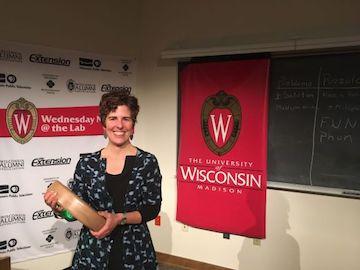University of Wisconsin political science professor Katherine Cramer gave a talk on community-driven listening and democracy as a part of the Wisconsin Idea lecture series, Tuesday night.
As a young girl growing up in Grafton, Wisconsin, the political conversations taking place in Cramer’s household made her wonder where people get their beliefs from. It is this fundamental question that has guided her career as an opinions researcher.
During Cramer’s tenure, she found people asking how to make people see the world according to their own viewpoint.
“In my field of public opinion, oftentimes the driving question is ‘what are people getting wrong?,’ ‘what is it that they don’t know?,’ ‘What is wrong with them?,’ ‘What can be fixed so they see the world the right way, which is often the way the speaker is seeing the world,’” Cramer said. “Well, I resist that question.”
Madison city council signs resolution declaring racism to be public health crisis
After Cramer received tenure, she embarked on a vast research project that would later become her award-winning book, “The Politics of Resentment: Rural Consciousness in Wisconsin and the Rise of Scott Walker”. The project’s original mission was to study public opinion in a variety of places. Cramer visited 27 rural communities, driving across Wisconsin in a rickety Volkswagen.
In the countless conversations she shared, she discovered a profound sense of disenfranchisement within the political identity of rural America. Many individuals felt the political decisions affecting their lives were made by people in the urban centers of Madison and Milwaukee without understanding the rural way of life, Cramer said.
“The folks making the decisions that affect our lives don’t know what life is like in a place like this and don’t respect it, because they think we’re uneducated, unsophisticated, racist, sexist, homophobic and Islamaphobic,” Cramer said, summarizing the collective political sentiment of rural Wisconsin.
After Donald Trump won the 2016 presidential election, caused in part by his ability to capitalize on that sentiment, Cramer’s book received a lot of traction. Nonetheless, the questions people would ask her about the book still carried an accusatory tone, Cramer said.
Despite the emphasis her book placed on listening to individuals from different backgrounds, many liberal readers wanted to know how to impart their worldview onto rural Americans.
In an effort to foster constructive public conversation and improve understanding across communities, Cramer partnered with Deb Roy, the director of MIT’s Laboratory for Social Machines, to create the Local Voices Network. The LVN, dubbed “the hearth,” is a physical recording and processing gadget whose appearance could best be described as an Amazon Alexa and as Cramer said is the “size of a hug.”
According to LVN’s website, political conversations using the hearth are supposed to be led by volunteers who facilitate a conversation among individuals reflecting the diversity within their community.
Conversations take place around the device, which records and analyzes the conversations using artificial intelligence with the aim of “offering local community members, media and leaders a new window into the issues important to the community.”
Cramer said she pictures a future where hearths are available in public libraries across the country.
“As a political scientist, a lot of this comes back to democracy for me,” Cramer said. “At its root democracy is about making decisions that affect one another and how can we do that if we don’t have a basic understanding of each other’s point of view.”












